Ahir Bhairav is a special raga; it is a combination of the komal rishabh (a major chord built on the lowered flatted second scale) along with a shuddha dhaivat (natural sixth) combined with komal nishad which results in a mix of emotions. This raga helps in meditation because it lends pensiveness, yet, positivity and hope as it is built in a style for composure of mind. The performance for this raga is sombrely. The philosophical depth of the raag has been used in emotional songs. Most of the songs set in this raga talk about unconditional love.
There is a sub caste in the Yadav community known as Ahir. The traditional occupation of Ahirs is cow-herding and agriculture. They are found throughout India but are particularly concentrated in the northern areas. According to musical folklore, the melody of their cowbells is supposed to be the foundation of this raga.
It sounds great in the Sharad Ritu (autumn season) when the hot and humid weather begins to recede and there is calmness in the surrounding. The autumn is marked by the brightly colored foliage that slowly drops from trees and shrubs to carpet the ground. The falling of leaves is signal of new beginning to come. Ahir Bhairva has been intelligently used by many composers in classical music; light classical, Bollywood film songs, ghazals or bhajans sung in the morning as Ahir Bhairav is a morning raga. Ahir Bhairav is close to a Carnatic Raga named Chakravakam.
I present here below three rich songs of Ahir Bhairav:
Albela sajan ayo re albela, Film: Hum Dil De Chuke Sanam 1999, Singers: Ustad Sultan Khan, Shankar Mahadevan, Kavita Krishnamurthy, Lyricist: Mehboob Alam Kotwal, Music Director: Ismail Darbar
In 1970s this song was popularized by Ustad Sulatn Khan and it became a super hit when it was used in film “Hum Dil De Chuke Sanam.” This song is the best illustration of Ahir Bahirav. The protagonist of the film is trained Opera Classical singer and is learning Hindustani Classical music from his Guru. You hear the voices of Shankar Mahadevan and late Ustad Sultan Khan; both brilliant in their own capacities. Ustad Sultan Khan used to play the sarangi effortlessly, and his voice suits perfectly to Vikram Gokhale in the role of a Guru teaching his student. On the other hand, Shankar Mahadevan sings the peppier part of the song with his dazzling vocals for Salman Khan who plays the shishya. These two singers are accompanied by Kavita Krishnamurthy who sings for Aaishwarya Rai – all three singers have superbly sung this classical song. I love this composition; it takes you to another world. On screen Vikram Gokhale, Salman Khan and Aishwarya Rai have done justice to the song.
Poocho Na Kaise Maine Yeh Raat Bitayi Film: Meri Soorat Teri Aankhein, 1963, Singer: Manna Dey, Lyricist: Shailendra Music Director: S.D.Burman
This 1963 movie was based on a Bengali novel and had Ashok Kumar playing the role of an “ugly” musician. In the movie all through Ashok Kumar’s face has been painted black. This song which is picturized on Ashok Kumar is sung by Manna Dey. In the story, after Ashok Kumar is abandoned as a baby by his rich Hindu father for being ugly, he is brought up by a kind Muslim man who is a musician and he encourages young Ashok Kumar to become a musician. The background of this song is that the foster father is on his death bed and listens to Ashok Kumar sing this melody and dies after the song is over. The lyrics are so intensely expressive that they touch your heart. Ashok Kumar’s invaluable expressions render a solemn touch to Manna Dey’s voice. He has sung this song so flawlessly in the movie. Listen to the song in early in the morning; it simply transcends your mood. Manna Dey’s voice portrays the anguish felt yet tightly controlled of a dejected man played by Ashok Kumar in the movie.
Man Anand Anand chayo Film: Vijeta 1983 Singers: Asha Bhosale & Pt. Satyasheel Deshpande, Lyricist: Vasant Deo , Music Director: Ajit Verman
Both Asha Bhosale and Pundit Satyasheeel Deshpande have rendered this song accompanied only by a Tanpura and Tabla. This song is a pure piece of raag Ahir Bhairav. In my opinion this is one of the best songs by Asha Bhosale she is matchless in her rendition. I doubt if any singer could do justice to this lovely musical piece. The music is given by Ajit Varman, a music director who was associated with the parallel film movement during the 1980s. He is said to have started his career as a musician for great director like Satyajit Ray. Ajit Varman made music for only about a dozen Hindi films but some of his songs are like pure pearls. ‘Man Anand Anand Chhayo’ is very well performed on screen by Rekha; her gestures and expressions are subtle and convincing. The lyrics of the song will touch your heart; it is about restless storm in the mind which is being tried to calm with a new day and the first rays of the sun.














































